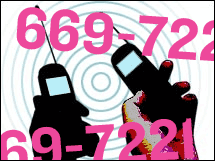BEND, Ore. (CNN/Money) � If the hassle of changing your cell phone number is the only reason you've stuck with your wireless carrier, you might want to start shopping for a better deal.

On Nov. 24, the Federal Communications Commission's (FCC) "local number portability" rule goes into effect in much of the country, giving cell phone customers the option of keeping their number when they switch carriers within the same geographic region.
Consumers have waited more than four years for the rule, which has been delayed several times since its initial 1999 deadline. This time, however, the change seems certain.
"The only thing that could stop it now is action in Congress," said Consumers Union policy analyst Adam Goldberg.
"When I wake up on Nov. 24 and it actually happens I'm going to feel really good," he added, while admitting that he won't really believe it until he sees it.
Telephone customers should also feel good. Not only will cell phone users get to keep their phone numbers, they may very well see better rates, terms and service as wireless carriers scramble to compete.
At the same time, customers of old-fashioned wireline phones could also see their rates come down. In certain cases, the rule will allow wireline customers to transfer their numbers to wireless phones, and vice versa.
What's the big deal?
As cell phone customers know too well, you can't take your phone number with you when you switch wireless carriers. Rather than deal with changing phone numbers, many customers stick with their carriers even if the cost is high and the service is sub par.
That may soon change, thanks to portability. The plan's proponents expect these and other benefits to emerge:
- Better stuff. New phones, with advanced features and lower prices, are sure to keep coming. Superior gadgetry -- think picture phones -- is an ever-popular enticement.
"We think the market will change quite a bit," said Bill Hardekopf, CEO of CellUpdate.com, a site that compares cell phone plans.
- Better prices. Free months or banked minutes may be waved in front of both new and existing customers, along with other financial enticements yet to be invented.
"Come the end of the month you might see some nice incentives for carriers who want current customers to extend their contracts," said Hardekopf.
- Better terms. Contracts with steep termination fees are another barrier to dumping a carrier. Carriers could initially roll out longer contracts with higher termination fees, but may compete over the long run by offering fewer binding contracts.
"It's going to be hard for carriers to stick with a system that punishes consumers," Goldberg said. "Consumers just won't accept that."
- Better service. The Management Network Group (TMNG) estimates that the turnover of personal cell phone users will jump from about 3 to 20 percent in the next 12 months as a result of portability. To stem that churn, companies will have to be, well, nicer.
Still, cautions Goldberg, "it may take some time for carriers to really understand the new competitive environment."
Cutting the cord at home
Portability could be a boon for all telephone customers.
That's because the rule will also give wireline customers the option of moving their home phone number to a wireless phone, depending on where the wireless carrier is located.
| Related Articles
|

|
|
|
|
"Right now the FCC is clarifying the limits on wireline-to-wireless portability," said Chris Murray, legislative counsel for the Consumers Union, adding that a decision should come next week. "What I'm expecting is that they'll define the scope to be about the size of an area code."
Once people have the option of switching their home number to a wireless phone (and vice versa), local carriers may have no choice but to lower rates.
"Wireless is the only competitor for local phone monopolies," added Murray. "If the FCC makes it easier for customers to cut the cord, that's our best hope for a competitive local market."
Please "port" my number
While they've been fighting the portability rule, wireless carriers have also been taking steps to comply with the changes.
"The carriers have been very focused on being ready," said Cathy McMahon, an executive for wireless portability at Telcordia, a software company that is handling number switching for seven of the eight largest carriers.
Beginning Nov. 24, consumers in the 100 largest metropolitan statistical areas can request that a new cell carrier "port" their current number. (The deadline for carriers serving the rest of the country is May 26.)
The new carrier will need to validate information with the old carrier and notify a centralized system, but all told, the process could take less than three hours, according McMahon. Wireline-to-wireless transfers, however, could take several business days.
 |
YOUR E-MAIL ALERTS
|
Follow the news that matters to you. Create your own alert to be notified on topics you're interested in.
Or, visit Popular Alerts for suggestions.
|
|
|
Though Telcordia has been testing the system for more than a year, potential glitches could arise if, for example, customers give inaccurate information about their old plans.
"It's a complex process with lots of systems interfacing with other systems," said McMahon. "There are places where things could go wrong."
What will it cost you? Wireless customers have actually been paying for the change for nearly two years in the form of a local number portability surcharge, typically around $1, levied on their bills.
The FCC has said that carriers can also charge a fee to departing customers who want to port their numbers, though it's likely that new carriers will offer to cover the cost of switching as long-distance carriers often do.

|

